Book contents
- Frontmatter
- Contents
- Dedication
- General editor's preface
- Acknowledgements
- Introduction
- 1 Theology and nation-building
- 2 The weight of dead generations
- 3 The rule of law: searching for values
- 4 Human rights and theology
- 5 Transcending individualism and collectivism: a theological contribution
- 6 Theology and political economy
- 7 Theology and economic justice
- 8 The right to believe
- 9 An unconcluding postscript
- Bibliography
- Index
7 - Theology and economic justice
Published online by Cambridge University Press: 13 January 2010
- Frontmatter
- Contents
- Dedication
- General editor's preface
- Acknowledgements
- Introduction
- 1 Theology and nation-building
- 2 The weight of dead generations
- 3 The rule of law: searching for values
- 4 Human rights and theology
- 5 Transcending individualism and collectivism: a theological contribution
- 6 Theology and political economy
- 7 Theology and economic justice
- 8 The right to believe
- 9 An unconcluding postscript
- Bibliography
- Index
Summary
Central to a theology of reconstruction is economic transformation. Recognising the weaknesses and failures of the dominant economic systems of both East and West, a commitment to economic democracy and social well-being requires a determined global effort aimed at the emergence of an economic order that transcends the weaknesses of both systems.
TOWARDS AN ALTERNATIVE VISION
The World Council of Churches had already defined the challenge facing the churches at its first Assembly in 1948:
The Christian churches should reject the ideologies of both Communism and laissez-faire capitalism, and should seek to draw men away from the false assumption that these extremes are the only alternatives. Each has made promises which it could not redeem. Communist ideology puts the emphasis upon economic justice, and promises that freedom will come automatically after the completion of the revolution. Capitalism puts the emphasis upon freedom, and promises that justice will follow as a byproduct of free enterprise; that too, is an ideology which has been proved false. It is the responsibility of Christians to seek new, creative solutions which never allow either justice or freedom to destroy the other.
John Paul II has, in turn, insisted that both liberal capitalism and Marxist collectivism ‘are imperfect and in need of radical correction’. Facing the implications of his own words, the Pope ponders the question ‘in what way and to what extent are these two systems capable of changes and updatings such as to favor or promote a true and integral development of individuals and people in modern society?’
- Type
- Chapter
- Information
- A Theology of ReconstructionNation-Building and Human Rights, pp. 231 - 253Publisher: Cambridge University PressPrint publication year: 1992



